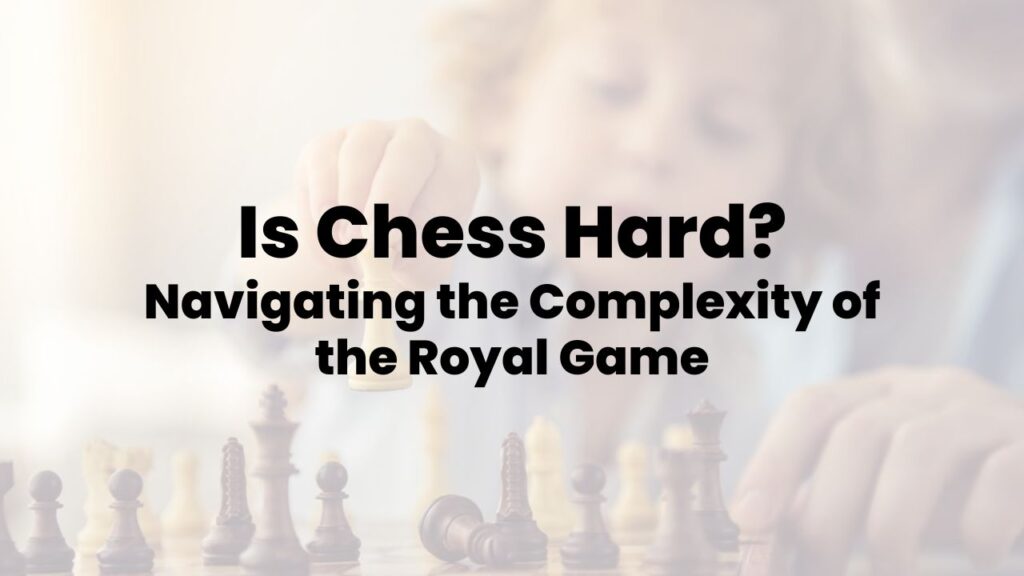Is Chess Hard? Navigating the Complexity of the Royal Game

“Is chess hard?” is a question that often echoes in the minds of beginners and curious observers alike. The allure of the 64-square battlefield and the intricacies of strategic warfare draw countless enthusiasts into the world of chess. Yet, the perception of its complexity can be both intimidating and intriguing. In this exploration, we unravel the layers of chess, examining its challenges, rewards, and the journey it presents to players.
The Complexity of Chess: A Multidimensional Game
1. Rules and Movements
At its core, chess is a game of rules and precise movements. Each piece moves uniquely, introducing beginners to a matrix of possibilities. This initial hurdle can seem overwhelming, but with practice, these movements become second nature.
2. Strategy and Tactics
Beyond the rules lies a labyrinth of strategy and tactics. Chess involves predicting your opponent’s moves, planning multiple steps ahead, and formulating strategies that can change on a whim. The balance between defense and attack, sacrifice and gain, is a hallmark of chess’s complexity.
3. Opening Theories and Variations
The vast world of opening theories and variations can be a maze for newcomers. Players must not only learn these but also understand the rationale behind them. This is where the cerebral aspect of chess truly shines, as memory, pattern recognition, and strategic thinking all come into play.
4. Positional Understanding
Chess isn’t merely about attacking or capturing; it’s about creating advantageous positions. Positional understanding involves controlling key squares, recognizing weak points in your opponent’s structure, and leveraging these elements to your advantage.
5. Endgame Mastery
The endgame, where fewer pieces remain on the board, is another level of complexity. Here, precise calculation and technique are crucial. Maneuvering to promote a pawn, creating mating nets, and converting small advantages into victory require a deep understanding of chess dynamics.
The Learning Curve: From Novice to Grandmaster
1. Early Stages: Learning the Ropes
The initial stages of learning chess can be tough. Grasping the basics, understanding notation, and becoming comfortable with movement patterns can feel like navigating unfamiliar territory. It’s a phase of absorbing information and building foundational skills.
2. Intermediate Challenges: Rising to Tactics
As players progress, tactics become a focal point. Solving tactical puzzles and recognizing combinations become paramount. This phase tests patience and critical thinking, pushing players to sharpen their calculation and pattern recognition skills.
3. Strategic Ascent: Mastering Openings and Planning
Entering the realm of strategy and openings demands dedicated study. Learning opening theories, planning your moves, and understanding middlegame structures open up a new layer of chess’s intricacies. Here, players face the challenge of applying their theoretical knowledge to practical gameplay.
4. Complex Endgames: The Ultimate Test
Endgames test a player’s deep understanding of the game. With fewer pieces on the board, the focus shifts to technique, calculation, and conversion of advantages. Mastering endgames is a testament to a player’s commitment to honing their skills.
Challenges vs. Rewards: The Chess Conundrum
1. The Challenge: Embracing Complexity
Chess’s complexity can be a double-edged sword. The learning curve is steep, and setbacks are inevitable. Patience and perseverance are essential to overcome these challenges. Navigating the intricacies of the game requires time, practice, and a willingness to learn from defeats.
2. The Reward: Cognitive Enrichment
While chess can be demanding, its rewards are abundant. Beyond victory, it offers cognitive benefits like enhanced memory, critical thinking, and strategic planning. The journey of unraveling chess’s complexity is a journey toward personal growth and mental enrichment.
Overcoming the Difficulty: Strategies for Aspiring Players
1. Start Small and Steady
Begin with the basics. Familiarize yourself with piece movements, rules, and basic tactics. As you gain confidence, gradually delve into more advanced concepts.
2. Learn from Masters
Studying games of grandmasters is like learning from the best. Analyze their strategies, understand their thought processes, and apply these insights to your own gameplay.
3. Practice Regularly
Consistent practice is key. Engage in games, both offline and online. Learn from defeats, and don’t shy away from challenging opponents.
4. Seek Guidance
Join a local chess club or online communities. Engage in discussions, seek advice, and learn from experienced players who have traversed the learning curve.
Conclusion: Embrace the Challenge, Reap the Rewards
“Is chess hard?” The answer is a resounding yes, but it’s a challenge that holds the promise of incredible rewards. Chess encapsulates the intricate dance of strategy, tactics, and psychology, offering a profound cognitive workout and an opportunity for personal growth. As players navigate the complexities, they embark on a journey that not only hones their skills on the board but also enriches their minds beyond measure. So, while the path may be arduous, the destination is a realm of intellectual fulfillment and mastery.
In the end, the perceived difficulty of chess is part of its allure. The road from novice to expert is paved with challenges that test not only a player’s skills but also their determination. The game’s complexity can be both a daunting hurdle and a gratifying pursuit, ultimately leading to a deeper understanding of strategy, sharpened cognitive abilities, and an enduring passion for the royal game.



